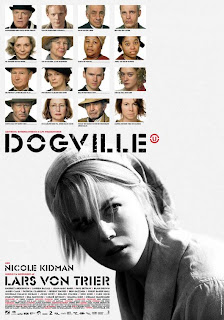
"In a musical, nothing dreadful ever happens."
Introduction
Asked what type of filmmakers inspire and influence Lars von Trier, the last thing one would consider is Busby Berkeley and The Sound of Music. As unlikely as it sounds, these established Hollywood musicals are what contribute to Dancer in the Dark, a musical tragedy starring Björk in the lead role. Contrasting filmmaking methods of hand-held naturalism and 100-camera musical-numbers, von Trier manages to fuse together a story of sadness and truth within a contextual setting that is the great US of A -a world whereby the American Dream is real for many, but unattainable for others.
A Clear Message
Located in Washington during the 1960's, we follow Selma (Björk), a Czech immigrant working within a factory and saving for an operation for her son, Gene (Vladica Kostic). He - and she - carry a hereditary illness that leads to blindness and Selma is in the final stages - using only touch and sound to help her work and travel. A version of the story could be told in fairytale form. The traveller (Selma) is cursed by blindness and to restore the sight of her Son, she must collect riches to offer a doctor. The Prince is Geoff (Peter Stormare), a man whose sole purpose is to protect Selma, with the assistance of Kathy (Catherine Denueve). The beast or villain is Bill Houston (David Morse) and his evil wife - products of the capitalist America. They take money from Selma (as she rents on their land) and are threatened by her - the evil wife suspects Selma and Bill are conducting an affair and Bill is jealous of Selma's money.
Subtle moments as Selma attempts to refuse a gift from Bill create a clear conflict of attitudes towards innate values. Selma says she is "not that type of Mother" who accepts gifts - or will even consider buying a bike for her Son. It is through the pressures of those around her that she relents and, due to Gene's happiness, she accepts the bike. As a sequence early in the film, this moment may give the impression that Selma - and Gene - have clearly been overpowered by the American values of wealth through the ownership of items.
But Dancer in the Dark is not merely a commentary on America - and it is not primarily political in its message (as Dogville is) as Selma, throughout the film fantasizes that she is within a musical. The clicking and valves within the factory becoming a rythmic beat that Selma leads in chorus. Wooden-tracks and industrial-trains are the percussion to a song about sight - as Selma sings to Geoff how she has seen everything. This escapism is intertwined within the naturalist fairytale offering an alternative perspective on America. Hollywood - a jewel in the crown of Americanism - may be seen as a perfect blanket used to cover the contradictions and paradox within the great USA. An image America sells to the world; a lie that those within America like to believe to give themselves a sense of safety and pride.
You Can't Leave...
Stig Björkman writes in Sight & Sound how Dancer in the Dark is part three in Lars von Trier's 'Golden Heart' trilogy, preceded by The Idiots and Breaking the Waves:
"Golden Heart was a picture book Lars had when he was a small child. It is the tale of an uncommonly good-natured girl who sets out into the woods on her own with bits of bread and other things in her pockets. At the end of the book because she has shared everything she possesses with those who have crossed her path she is naked and destitute. But her last line is full of implicit fiath: 'I'll manage all right, just the same'. This expression of the extreme consequences of playing the martyr is engraved on von Trier's consciousness."This particular intepretation feeds into the fairytale interpretation presented, but also argues a cynical pessimism too. Selma, as our protaganist, is likeable and in Björk's touching, sensitive performance, lovable. She needs and demands protection - and Geoff's sincreity shines through moreso than Bill and Linda (Cara Seymour) despite the roof they provide - for money - over Selma's head.
It is clear that to ensure a strong education for Gene (the opening sequence portrays Gene as a serial truanter), to gain the best health (for Gene's sight) and even to gain fair trial in the courts you need money. This money defines your way of life and your attitudes towards others. It corrupts Bill and ultimately destroys the goodness they have inside. Imagination and escapism is all anyone has to escape the relentless monotany of life.
Last Breath
The final act of the film reinforces how Americanism dilutes the brutal and horrific reality of a society built on contradicting foundations. Despite the musical numbers and the final moments that attempt to "brighten" up what is difficult to view - we see through the dancing and the singing; we see through the glossy, "Hollywood" version protrayed; we see only animalistic, dog-eat-dog values.
You cannot leave; you cannot walk away. Björk holds her own as we are fully invested in her character - as we don't believe this is a musical anymore. There is truth in this fairytale as there is truth within all fairytales. Dancer in the Dark polarised audiences - critics complaining of the "sentimentality" and "fakery" of the film. But you can argue that this is what resonates the most as von Trier, though shooting naturalistically, the musical-numbers and the character of Selma are products of Hollywood. Selma, as a character, personifies selflessness and beauty - and in that beauty is truth. Indeed, in Dancer in the Dark, the truth resonates.






































